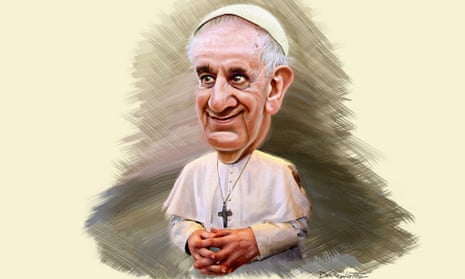On Sunday morning in Chicago, Crispin Torres was looking at the Catholic Church from the inside-out. This was outside St Gertrude Parish on the north side of town, which can be equal parts liberal and conservative, and just a few miles north of the neighborhood to which Torres had moved a few decades ago from Mexico, which is widely Catholic and has same-sex marriage laws. The 29-year-old attends regularly, he told me, and he has always felt welcomed – by this church, in Chicago, if not always by the Vatican:
I take what I need out of my faith. I don’t need their affirmation to feel like I am welcome. ... And I am only going to go to a church that believes I belong there.
Further south, outside Chicago’s Boystown neighborhood, I met Maria Brown as she was leaving Our Lady of Mount Carmel, to head home after working the overnight shift and then attending mass, like she does each Sunday. As we walked and spoke about the unsettled and unsettling schism between the supposedly conservative Church leaders in Italy and the increasingly progressive Catholic congregation thousands of miles away, she looked me in the eye:
You don’t really have to follow [the Bible] word by word. ... You should follow whatever applies to your life and family.
This was the recurring sentiment from many American Catholics I interviewed over the past week: They were not all mirror images of each other, but they didn’t expect their local church to mirror the Vatican either. And for a week that began with Pope Francis’s new liberal-ish establishment looking to take its most equal-minded stance on LGBT families and people, only to have his bishops take a regressive step back in their final synod released on Saturday, perhaps that is the more important – if silent, if whispered and prayed – sentiment that too many Vatican watchers ignore: Times are changing too fast for even the most liberal pope in the history of Catholicism.
Oz, it turns out, can’t control the growth of the lollipop gays. Turns out that most representative Catholics in the west are cool with that.
Consider that more American Catholics than ever support same-sex marriage and LGBT workplace rights. Consider that more than half of American Catholics do not even consider homosexuality a sin anymore, joining the ranks of other large countries like Britain, Argentina and others that agree.
So how do 118 conservative bishops in Europe maintain watered-down, old-school policies when in all actuality their congregation is one of the most progressive religious groups in numerous countries – particularly the US? Maybe it’s because the real new liberal-ish Catholics just aren’t going to church anymore.
Pew Research data released this year found that if you go to church weekly, then you’re more likely to have anti-gay sentiments. The same survey found that Americans who attend church more regularly are older and less likely to support gays and lesbians, while younger folks attend church at lower rates – and a full 85% of those 18- to 29-year-olds currently support gays and lesbians. These changes have been brewing for decades now, and all signs point to one simple trend: less church, more liberal.
Since the 1950s, regular US church attendance rates have dropped from 75% to now 45%, depending on which of the various controversies are occurring when. It is one of the most dramatic losses of faith in a country partly built on it.
More interesting is what American Catholics started doing when they weren’t at church: they became more understanding on their own.
Researchers at the University of Chicago have found that since their authoritative General Social Survey demographics project began more than 40 years ago, American Catholics have been the most progressive group – even compared to Americans overall. Catholics have consistently supported liberal issues like divorce, gays teaching in schools and, most radically, seeing gay sex as not “wrong at all”. When you look at real-life comparisons instead of stubborn doctrine from on high, many modern Catholics are on another end of the ideological spectrum from the Vatican – and have progressively been heading there, however quietly, for decades now.
From my conversations over the past week, it became quite clear that the Church needs to do something, on the ground and not just at St Peter’s, about closing the oceanic gap on so many modern issues between its leadership and its congregation. The alternative is something like in Germany, where attendance is in the single-digits and fading, as LGBT rights and other progressive issues like capital punishment and immigration continue to make great strides with the Church. The entirety of leadership in Oz, not just the pope, needs to finally step out from behind its curtain and allow the world to help shape their opinions, because right now not too many people across the actual ocean are listening to much of what the Vatican has to say.
Before I could say goodbye to Maria Brown on the steps of Mount Carmel, before she left with a friend who floated behind her during our conversations, she made sure to tell me something: “The world is changing,” said the old Chicago liberal. Of the old Vatican guard, she said: “They should also change.” That, I thought, is probably what Pope Francis is thinking every day. It’s what his bishops should be thinking when and if they wake up this week.

